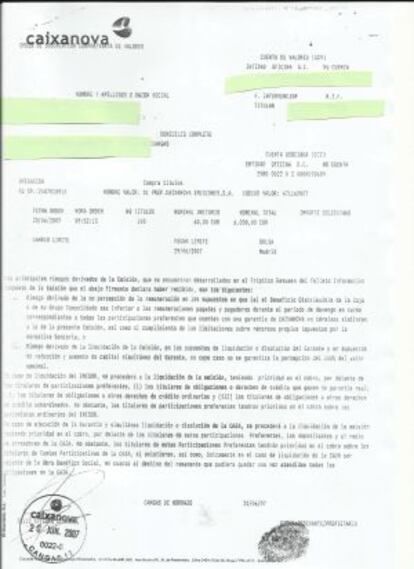Smudge on the dotted line: savings bank duped customers with share offer
Galician lenders investigated over preferential selling sometimes without proper consent

Caixanova, the failed savings bank that merged with Caixa Galicia to create NovaGalicia in late 2010, and which in turn was taken over by the Bank of Spain, mis-sold shares to hundreds of customers to generate cash and inflate its book value, according to documents seen by EL PÁIS. The documents show that the bank systematically ignored the National Securities Commission’s (CNMV) recommendations to only offer shares to customers with experience of the financial markets.
One purchase form for 6,000 euros’ worth of shares dating from 2007 was signed with a fingerprint by an 86-year woman.
Several memorandums sent by the head office of the Caixanova to branches between 2004 and 2009 encouraged bank staff to sell, on a “preferential” basis to its customers shares and CDOs, or Collateralized Debt Obligations — complex financial tools that repackage individual loans into a product that can be sold to investors on the secondary market, typically made up of auto loans, credit card debt, mortgages, or corporate debt. Caixanova’s policy not only generated more cash to make new loans, but moved the risk of those loans defaulting from the bank to investors, as well as giving it new and more profitable products to sell, which boosted share prices and managers’ bonuses. But the strategy flew in the face of the CNMV’s instructions advising banks to exercise caution when selling such products, and to carefully assess potential buyers.
Several Caixanova customers who bought preferential shares have told EL PAÍS that they were never asked about their knowledge or understanding of the financial markets. Some had copies of still-unsigned purchase forms. The lack of any guarantees to protect customers has been highlighted by consumer protection groups as well as Galicia’s top court, which is to bring charges against NovaGalicia. Carlos Varela, the chief prosecutor of the Galician High Court, said last week that the case against Novagalicia would represent people who had already brought cases against Caixanova for mis-selling shares, and who subsequently saw their investments wiped out when the price collapsed and the bank was taken over by the Bank of Spain.
Caixanova even used money from depositors to buy shares without their knowledge
Varela says that he is aware of cases where Caixanova even used money from depositors to buy shares for them without their consent. He adds that his office is currently looking into around 500 cases of customers who were mis-sold shares.
Spanish banks sold around 30 billion euros’ worth of so-called preferential shares between 1999 and 2011. Growing numbers of investors who feel that the risks associated with buying shares in their banks, many of which had huge investments in the property sector and were hard hit when the real estate bubble burst, are now seeking legal redress. The regional government of Galicia has advised bank customers who feel that they were duped to seek arbitration.
No definitive solution has yet been found to help Caixanova customers. Some other savings banks that have been taken over by the Bank of Spain have proposed setting up an account that would allow customers who bought preferential shares to get their initial investment back. NovaGalicia has been given money from the FROB Orderly Banking Restructuring Fund. It remains to be seen whether Novagalicia’s customers will benefit directly from the EU bailout of the Spain’s banking sector.
Tu suscripción se está usando en otro dispositivo
¿Quieres añadir otro usuario a tu suscripción?
Si continúas leyendo en este dispositivo, no se podrá leer en el otro.
FlechaTu suscripción se está usando en otro dispositivo y solo puedes acceder a EL PAÍS desde un dispositivo a la vez.
Si quieres compartir tu cuenta, cambia tu suscripción a la modalidad Premium, así podrás añadir otro usuario. Cada uno accederá con su propia cuenta de email, lo que os permitirá personalizar vuestra experiencia en EL PAÍS.
¿Tienes una suscripción de empresa? Accede aquí para contratar más cuentas.
En el caso de no saber quién está usando tu cuenta, te recomendamos cambiar tu contraseña aquí.
Si decides continuar compartiendo tu cuenta, este mensaje se mostrará en tu dispositivo y en el de la otra persona que está usando tu cuenta de forma indefinida, afectando a tu experiencia de lectura. Puedes consultar aquí los términos y condiciones de la suscripción digital.








































